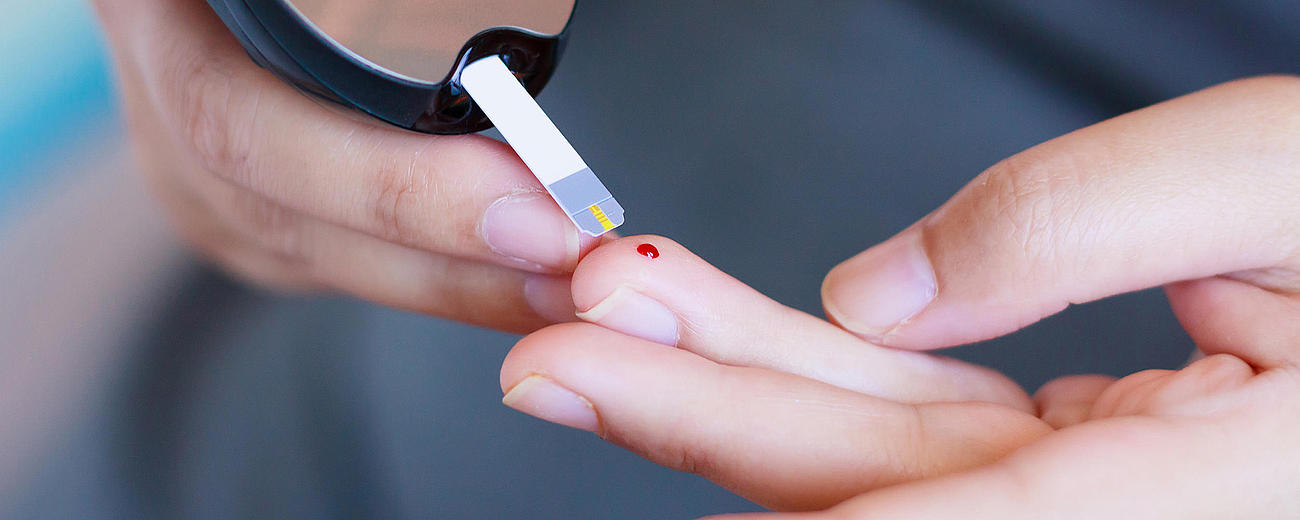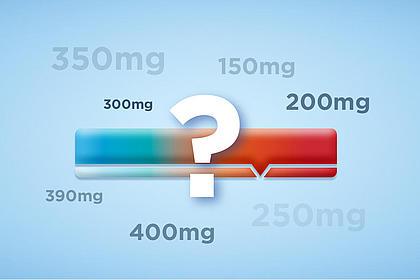Magnesium & Diabetes: Wadenkrämpfe als Begleitsymptom

Diabetiker sollten besonders auf eine ausreichende Magnesiumversorgung achten. Denn in zahlreichen Untersuchungen bei Patienten mit Typ-2-Diabetes wurde eine verringerte Magnesiumkonzentration im Blut nachgewiesen. Lesen Sie hier mehr über die Zusammenhänge von Magnesium und Diabetes.
Magnesium & Diabetes – die wichtigsten Fakten
- Typ-2-Diabetiker weisen oft eine niedrigere Magnesiumkonzentration im Blut auf.
- Gründe: vermehrter Verlust von Magnesium über den Urin, Vermeidung von kohlenhydratreichen Lebensmitteln mit hohem Magnesiumgehalt
- Eine ausreichende Magnesiumzufuhr kann das Ansprechen der Zellen auf Insulin erhöhen.
Daher gilt: Bei Diabetes sollte ausreichend Magnesium zugeführt und auf mögliche Anzeichen für eine unzureichende Versorgung wie Wadenkrämpfe geachtet werden.
Wadenkrämpfe bei Diabetes – möglicherweise Anzeichen eines Magnesiummangels
Was viele nicht wissen: Magnesium ist gerade für Menschen mit Diabetes von besonderer Bedeutung. Denn in zahlreichen Untersuchungen wurde bei Typ-2-Diabetikern eine verringerte Magnesiumkonzentration im Blut nachgewiesen.1 Vor allem die verstärkte Ausscheidung von Magnesium über die Nieren, die sich als Folge des erhöhten Blutzuckerspiegels einstellt, ist als Hauptgrund für eine unzureichende Versorgung mit dem Mineralstoff anzuführen.
Darüber hinaus vermeiden Diabetiker häufig kohlenhydratreiche Lebensmittel wie Getreideprodukte und Hülsenfrüchte, die einen hohen Magnesiumgehalt aufweisen. Ein Hinweis auf einen Magnesiummangel bei Diabetes können beispielsweise nächtliche Wadenkrämpfe, Lidflattern oder ein Kribbeln in den Fingern sein.
Warum Magnesium bei Diabetes so wichtig ist
Um zu verstehen, welche zentrale Rolle Magnesium bei Diabetes spielt, ist es wichtig, die Hintergründe über die Zuckerkrankheit zu kennen. Wir haben für Sie einige zentrale Fakten zusammengestellt:
Bei Typ-2-Diabetes ist das körpereigene Regulationssystem zur Kontrolle des Blutzuckerspiegels gestört. Normalerweise sorgt das Stoffwechselhormon Insulin, das in der Bauchspeicheldrüse produziert wird, für „Ordnung“: Es übernimmt die Verteilung, Verwertung und Speicherung des Zuckers im Körper. Bei Typ-2-Diabetes wird der Blutzucker nicht mehr optimal in die Körperzellen aufgenommen.
Der Grund liegt in der sogenannten Insulinresistenz. Das bedeutet, dass die Glucose aus dem Zucker mithilfe des Insulins nicht mehr in die Zellen eingeschleust werden kann, obwohl der Körper (noch) ausreichend Insulin produziert. Daraus resultiert ein dauerhaft erhöhter Blutzuckerspiegel, der irgendwann Schäden an Blutgefäßen, Organen und Nerven hervorrufen kann (diabetische Folgeerkrankungen).
Beim Punkt „Insulinresistenz“ kommt Magnesium ins Spiel. Denn Magnesium unterstützt die Aufnahme des Zuckers aus dem Blut in die Zellen – fehlt der Mineralstoff, kann dies eine Insulinresistenz begünstigen. Eine ausreichende Zufuhr von Magnesium kann also die Insulinsensitivität der Zellen erhöhen und spielt damit für Menschen mit Diabetes eine ganz zentrale Rolle.
Gute Magnesiumversorgung bei Diabetes: Magnesium-Präparate ohne Zucker
Eine ausreichende Versorgung mit Magnesium ist bei Diabetes also wichtig. Die von der Deutschen Gesellschaft für Ernährung (DGE) empfohlene Zufuhrmenge beträgt für Frauen ab 19 Jahre 300 mg, für Männer 350 mg pro Tag.2 Moderne Magnesium-Präparate aus der Apotheke wie von Biolectra® Magnesium ermöglichen eine bedarfsgerechte Magnesiumversorgung mit verschiedenen Darreichungsformen.
Der gut verträgliche Mineralstoff lässt sich mit allen Diabetes-Medikamenten und auch mit Insulin kombinieren – Wechselwirkungen sind bisher nicht bekannt.
Wichtig: Bei den ersten Anzeichen frühzeitig zum Arzt
Wer an Diabetes leidet, sollte grundsätzlich auf mögliche Anzeichen von Magnesiummangel wie zum Beispiel Wadenkrämpfe oder Lidzucken achten und frühzeitig zur Abklärung der Ursachen einen Arzt aufsuchen.
Vorbeugung: Gute Magnesiumversorgung kann Diabetes-Risiko senken
Eine ausreichende Magnesiumversorgung ist jedoch nicht nur bei Diabetikern wichtig. Wie Studien zeigen, haben Menschen, die ausreichend Magnesium zu sich nehmen, auch ein signifikant niedrigeres Risiko, an Diabetes zu erkranken.3
Umso wichtiger ist es, stets auf eine magnesiumreiche Ernährung im Alltag zu achten. Bei erhöhtem Bedarf (zum Beispiel Sportler und Personen die körperlich oder mental stark gefordert sind) können zudem Magnesium-Präparate, zum Beispiel von Biolectra® Magnesium, bei der täglichen Versorgung unterstützen.



